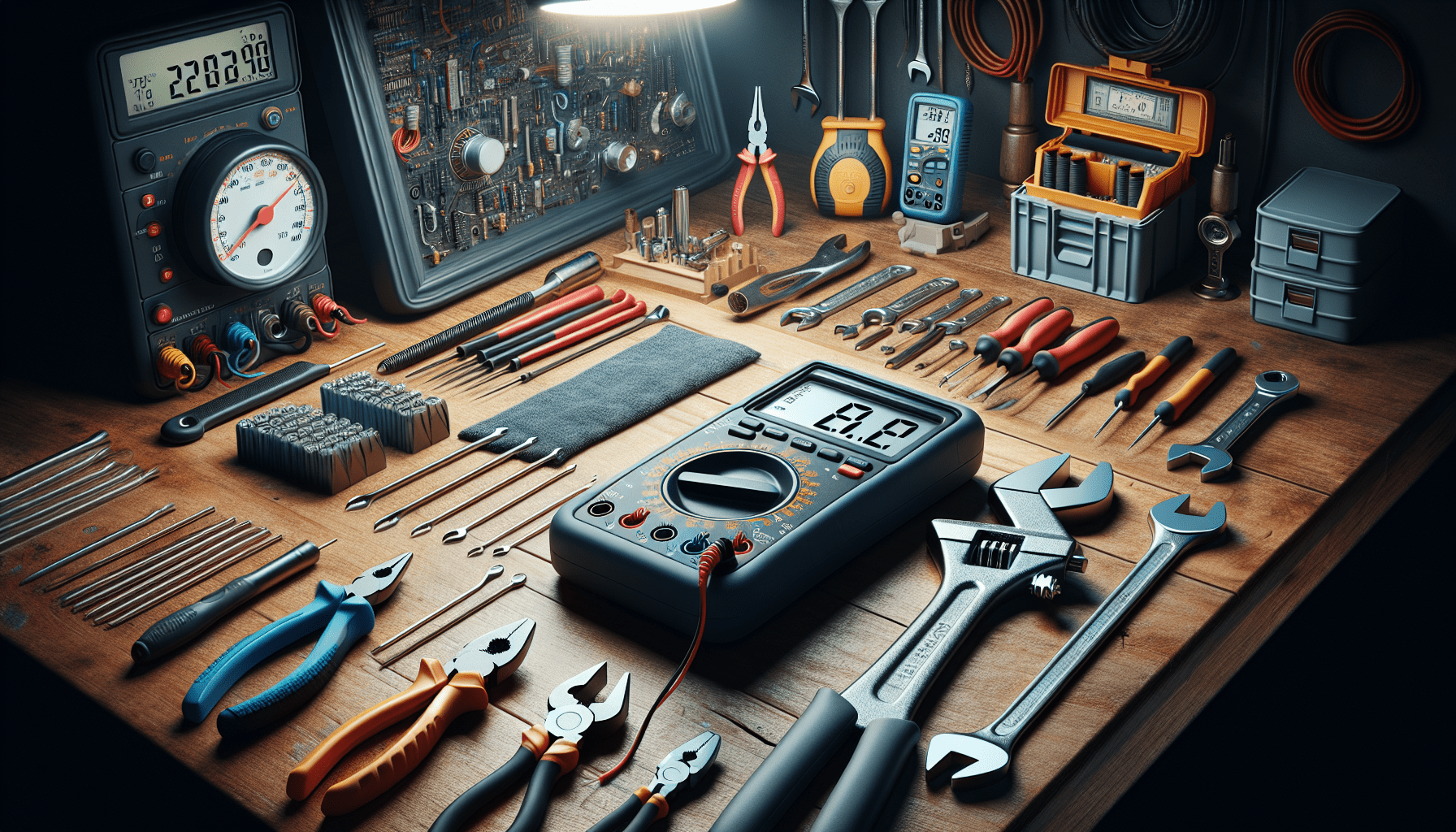

HVAC Services
Get Professional Repairs From The Area's Trusted HVAC Technicians. Ask About Our Services! We Offer Professional Heating & Cooling System Repairs And Guarantee Long-Lasting Results.
Got Question? Call us: (850) 678-2665Financing
Essential HVAC Tools For DIY Enthusiasts
Uncover the must-have HVAC tools for DIY enthusiasts! Equip yourself with essential gadgets and insights for safe, successful home projects. Dive into the details!

Are you considering taking on HVAC projects by yourself but unsure of which tools you’ll need? Embarking on a DIY HVAC venture can be both exciting and daunting. Whether it’s managing your home’s heating, ventilation, or air conditioning system, having the right tools is crucial for your success and safety. This guide will equip you with essential insights into all the handy, must-have tools for any DIY enthusiast interested in HVAC work.

Understanding the Basics of HVAC Systems
Before diving into the tools, it’s crucial to understand what HVAC entails. HVAC stands for Heating, Ventilation, and Air Conditioning, which are essential elements to ensure comfort and air quality in your home. Each component works in tandem to control temperature, humidity, and air circulation, making your living space more comfortable.
Why DIY HVAC?
Choosing to handle some of your HVAC tasks saves money and allows you to better understand the intricacies of your home systems. Additionally, honing your skills can be satisfying, providing a heightened sense of accomplishment each time you troubleshoot or improve your HVAC setup. However, safety should always be at the forefront of your efforts. While DIY projects are rewarding, always know your limits. Remember, for complex issues, consulting professionals, such as those at Tempacure Heating and Air Conditioning, can prevent costly errors and enhance safety.
Essential Tools for HVAC DIY Projects
Embarking on DIY HVAC requires a solid collection of tools to ensure you can address common issues effectively. Here’s a comprehensive list to help you get started.
Basic Hand Tools
While these might seem simple, they lay the groundwork for almost any HVAC task you might encounter.
-
Screwdrivers: A set of screwdrivers, both flat-head and Phillips, is essential for tightening or loosening screws and other fixtures. For HVAC work, magnetic-tipped screwdrivers can be invaluable in hard-to-reach places.
-
Wrenches: Adjustable wrenches are versatile and can handle a wide range of nuts and bolts found in HVAC systems. Consider getting a set that includes different sizes for various tasks.
-
Pliers: Needle-nose pliers and channel locks are indispensable for tasks such as holding objects firmly, bending wires, or accessing tight spaces.
Measurement Tools
Accurate measurements are vital for diagnosing HVAC issues and ensuring safe installations.
-
Multimeter: A digital multimeter helps you measure voltage, current, and resistance, making it crucial for diagnosing electrical problems within your HVAC system.
-
Thermostat: A reliable thermostat ensures you’re getting accurate readings of your home’s current temperatures, which can directly influence HVAC performance.
-
Tape Measure: When aligning ductwork or determining the size of a replacement part, precise measurements are necessary. Having a tape measure on hand is essential for these tasks.
Specialty HVAC Tools
These tools are specifically designed to handle the unique demands of HVAC systems.
-
Refrigerant Gauge: Important for checking refrigerant levels, these gauges ensure your system is operating efficiently without straining the components.
-
Tubing Cutter: Ideal for cutting through pipes and tubing cleanly, making adjustments to your system’s layout or replacing parts when needed.
-
Vacuum Pump: Used to remove contaminants and air from refrigeration systems, a vacuum pump is invaluable when introducing new refrigerants into your system.
Safety Equipment
Your safety should never take a backseat during HVAC work. Proper safety equipment protects you from hazards such as dust, sharp edges, and electrical shocks.
-
Safety Glasses: Protect your eyes from debris and dust when cutting, drilling, or handling any HVAC components.
-
Gloves: Prevent cuts and abrasions by wearing heavy-duty work gloves, especially when dealing with metal fixtures and sheet metal.
-
Ear Protection: In a world of loud compressors and buzzing tools, protecting your hearing with proper ear protection reduces the risk of hearing loss.
Maintenance Tools
Regular maintenance keeps your HVAC system in tip-top condition, ensuring longevity and efficiency.
-
Fin Comb: A fin comb helps straighten the bent fins on your AC unit, promoting proper airflow and better overall efficiency.
-
Coil Brush: Dust and grime accumulate on condenser and evaporator coils, impeding functionality. A coil brush helps you gently clean these surfaces.
-
Filter Puller: An often overlooked tool, a filter puller aids in removing hard-to-reach filters, making it easier to perform routine maintenance.
Best Practices for Using HVAC Tools
Using tools properly not only ensures the job is done right but also protects your tools and yourself from accidents. Here are some best practices:
Tool Care and Maintenance
Well-maintained tools save you time and effort. Regularly clean and oil tools to prevent rust, and store them in a cool, dry place. Check electrical tools for frayed wires or broken parts and replace any damaged equipment.
Safety First
Before handling any HVAC systems, ensure power is turned off at the breaker. Review safety manuals, wear appropriate protective gear, and, if unsure, consult expert sources or services like Tempacure Heating and Air Conditioning for guidance.
Knowledge is Power
Understanding the fundamentals of how tools work enhances safety and efficiency. Utilize manuals and online resources to learn the specifics about the tools you plan to use.
When to Consider Professional Help
While DIY HVAC tasks can be fulfilling, there are situations where professional expertise is necessary. Complex problems involving refrigerant lines, potential gas leaks, or extensive electrical work should be left to professionals, as errors can lead to more significant issues or safety hazards.
In such cases, companies like Tempacure Heating and Air Conditioning provide expert help, ensuring your HVAC system is running optimally. With their contact details below, you’re always one step away from professional advice if your DIY venture goes beyond your comfort zone.
-
Tempacure Heating and Air Conditioning
- Address: 325 Cedar Ave S, Suite B, Niceville, FL 32578
- Phone: (850) 678-2665
- Website: tempacurehvac.com

Conclusion
Armed with the right tools and knowledge, you’ll find that DIY HVAC projects can be a rewarding way to improve or maintain your home’s systems. Whether it’s fixing a minor leak, checking your refrigerant, or general maintenance, the key is to start with the essentials listed here. Always prioritize safety, understand when a professional touch is needed, and embrace the learning journey that DIY provides.
While this guide offers a deep dive into necessary tools and practices, remember that patience and practice are your best companions in any DIY undertaking. Don’t rush, understand each process thoroughly, and gradually build on your skills. Reaping the benefits of a well-maintained HVAC system is worth the effort, and you might just enjoy the empowering process of handling your home’s HVAC needs confidently.







